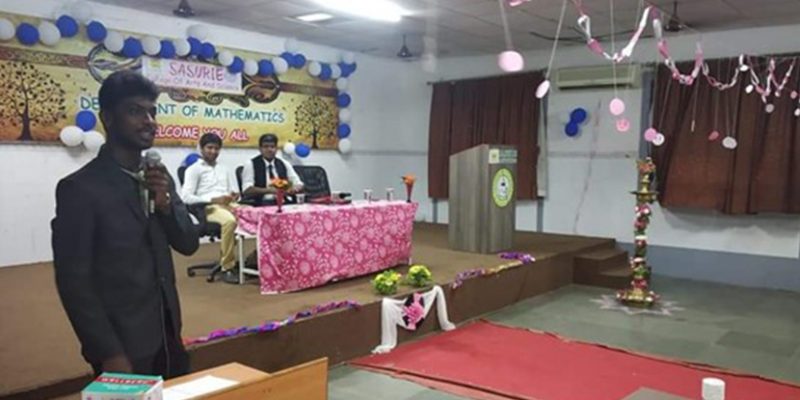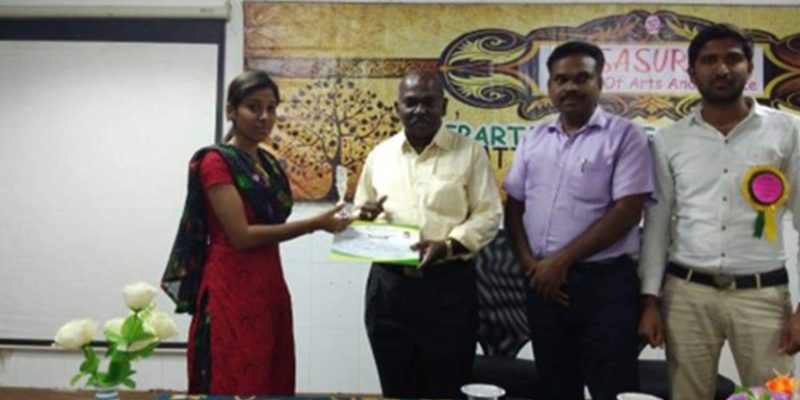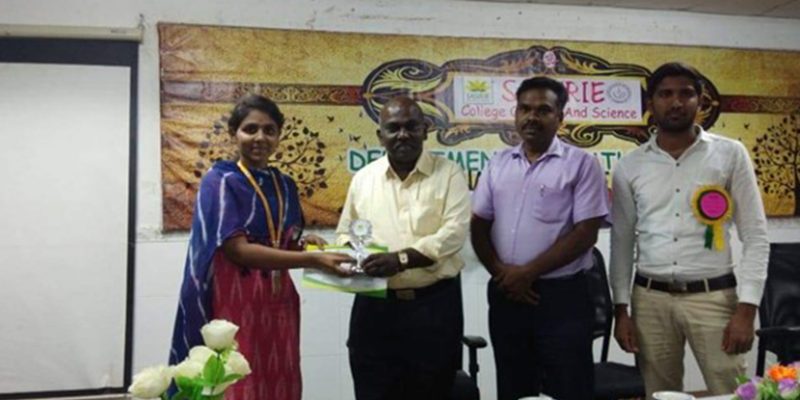Overview
The Department of Mathematics has started in the year 2011. The UG Program started in the year 2011. In the year of 2015, PG Program started. These two programs are successfully offered by the Department of Mathematics and most of the students are placed in IT Companies. The department that organizes Computer Applications is transformed into B.Sc. Mathematics; the curriculum of the courses covers not only the wide area of pure mathematics but also some of the areas of applied and industrial Mathematics, which makes the course multi-disciplinary nature.
The department provides a conducive atmosphere for students learning process. They are prepared to face interviews confidently and get attractive placements. The department under the vision is to achieve academic excellence, develop talents as well as practical skills, and inculcate healthy attitudes through systematic and effective teaching. The Department caters to the overall development of the students through competitions, seminars, and guest lectures. The Department of Mathematics has produced some distinguished University ranks.
Our Vision
To be a premier center of excellence in mathematics education and research, fostering transformative learning that empowers students to become innovative thinkers, analytical problem-solvers, and contributors of new mathematical knowledge for the advancement of society and industry.
Our Mission
- To deliver a rigorous and inclusive mathematics curriculum that cultivates logical reasoning, problem-solving abilities, and a strong foundation in mathematical concepts.
- To inspire innovation and interdisciplinary collaboration through research that addresses real-world challenges and advances mathematical knowledge.
- To equip students with critical thinking and analytical skills to excel in academic, industrial, and research-oriented careers.
- To prepare students to assume leadership roles in diverse fields by applying mathematical principles to drive innovation and societal progress.
Scope
Mathematics is the systematic study of the measurement, calculations, relationships, and properties of quantities and sets, using numbers and symbols. The scope of mathematics has no boundaries. The subject teaches us to be good problem solvers.
Mathematics covers a broad range of themes. Hence, you can choose any major field like Statistics, Operations Management, Accountancy, Actuarial science, and many more. You can join academics after acquiring a bachelor’s degree in Mathematics. Being a Mathematics student, you can pursue a career in data analysis which is currently in high demand. There are different fields after completing a bachelor’s degree in Mathematics.
- Statistician
- Actuary
- Data scientist
- Economist
- Mathematician
- Market Researcher
- Professor
- Accounting
- Actuarial Analyst
- Mathematical Analyst
- Operations Research Analyst
- Software Technologist
- Banker
- Block chain Developer
- Business Analytics
- Complexity theory
- Computational Mathematics
- Engineer
- Machine Learning
- Management
- Mathematical logic
- Mathematics Teacher
Course Offered
- B.Sc., Mathematics
- M.sc., Mathematics
Eligibility
B.Sc., Mathematics Honours is a three years graduate degree, the eligibility is the 12th class from a recognized school board or its equivalent exam.
Duration
B.Sc., Mathematics is a 3-Year duration Undergraduate course that deals with the discipline of mathematics along with the analysis of numbers.
Features – Classroom
The classrooms provides a better experience to gain a knowledge through the faculty members.
Highlights
The students of Mathematics Department has widely encouraged by the faculty members to participate in the inter and intra college competitions.
Course Outcomes – Course: MT101:Algebra and Geometry
- CO1: To learn the divisibility of integers and congruence relations
- CO2: To learn operations on polynomials, finding GCD of two polynomials and roots of polynomials.
- CO3: To learn basic matrix algebra and methods to find solutions to a system of linear equations. Also to learn eigen values and eigenvectors of a matrix.
- CO4: To learn analytical geometry of 2 and 3 dimensions which include the study of conics, planes, lines, sphere, cone, and cylinder.
Course: MT102: Calculus and Differential Equations
- CO1: To learn the basic properties of real numbers and their subsets which is the backbone of Real Analysis.
- CO2: To study functions in detail which is a fundamental structure in all sciences, and to be able to check the continuity of a function.
- CO3: To apply the notion of derivative in mean value theorem and also in higher order derivatives which arise in all applied sciences
- CO4: To be able to solve first-order and first-degree differential equations
Course: MT103: Mathematics Practical
- CO1: Problem-solving skills of students are enhanced
- CO2: Theoretical concepts are strengthened by solving the maximum no. of problems
- CO3: Due to one-to-one interaction with the teacher doubts of the students get cleared if any.
- CO4: Students learn how to apply mathematical concepts to practical and real-life problems.
- CO5: Interdisciplinary approach is developed.
Course: MT331Metric Spaces
- CO1: To equip students with basic mathematical tools such as open & close sets, continuity, connectedness, and compactness which can be used to study general topology and real & complex analysis.
- CO2: To enhance abstract thinking and visualization of students.
- CO3: To generalize the notion of distance, convergent sequence, and continuity of functions.
- CO4: To increase problem-solving ability by solving examples and counter-examples of various concepts involved.
Course: MT332 Real Analysis I
- CO1: To learn basic techniques and examples in analysis to be well prepared for courses like Topology, Measure theory, and Functional analysis.
- CO2: To study various types of sets and relations and concepts of countable and uncountable.
- CO3: To study the concept of sequence and series and hence find the sum of infinite terms with different methods
- CO4: To study the notion of lub and glb which helps to learn integrations that help to find areas under any functions
Course: MT334 Group Theory
- CO1: To learn fundamental properties and mathematical tools such as closure, identity, inverse, and generators
- CO2: To study algebraic structure ‘Groups’ in detail which is useful in the study of Rings, Modules, Algebraic topology, Analysis
- CO3: To enhance the abstract thinking of students.
- CO4: To learn to compare two different algebraic structures and study the transfer of properties between these structures through homomorphism and isomorphism.
Course: MT335 Ordinary Differential Equations
- CO1: To learn methods to solve linear differential equations with constant coefficients.
- CO2: To learn methods for solving non-homogenous differential equations
- CO3: To learn the power series solution method using ordinary and singular points
- CO4: To solve a system of first-order differential equations
Course: MT347F Computational Geometry
- CO1: Students learn the representation of objects in 2D and 3D in the form of matrices
- CO2: To study the transformations like reflection, rotation, scaling, shearing, and translation of objects in 2D and 3D, and their geometrical significance.
- CO3: Students learn to generate plane curves by using parametric equation
- CO4: All the concepts help students to learn the graphic displays of objects on the computer.
http://syllabus.b-u.ac.in
Events
SCIENCE EXPO (JUNIOR & SENIOR LEVEL) for an inter-school meet on 23rd Feb 7 and JAM, cooking without fire and miming for an Inter-Techno Cultural Inter-Techno Cultural Fest for Engineering. Polytechnic and Arts & Science on 24th and 25th Feb have been conducted by the Department of Mathematics in SRISHTA’ 2023.





